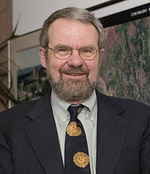Demons and Butterflies: Weather Predictability and Predictions
| Date/Time: | Thursday, 28 Mar 2013 at 8:00 pm |
|---|---|
| Location: | Sun Room, Memorial Union |
| Cost: | Free |
| Contact: | |
| Phone: | 515-294-9934 |
| Channel: | Lecture Series |
| Categories: | Lectures Live Green |
| Actions: | Download iCal/vCal | Email Reminder |
Recently, Richard Anthes has helped oversee the U.S.-Taiwan observation system known as COSMIC, which gathers global data about developing hurricanes, climate change, and other atmospheric events. He also co-chaired the 2007 National Research Council Committee that warned NASA's aging satellite system was inadequate for the nation's science and technology priorities. Anthes is president emeritus of the University Corporation for Atmospheric Research, which manages the National Center for Atmospheric Research.
The concept of predictability of complex systems has fascinated scientists for centuries.
In the 17th century Gottfried Leibnitz speculated that everything proceeds mathematically, and so someone who had sufficient understanding and could take into account everything, "would be a prophet and see the future in the present as in a mirror." About a hundred years later the Marquis de Laplace dreamed of an intelligent being (an intellect, later dubbed Laplace's Demon) who knew the positions and velocities of every single atom and used Newton's equations of motion to predict the future of the entire universe. In 1972 Edward Lorenz gave a talk on atmospheric predictability with the title "Does the flap of a butterfly's wing in Brazil set off a tornado in Texas?" This rhetorical and provocative question has intrigued scientists and the public ever sense, and "the butterfly effect" has come to mean chaos and lack of predictability of chaotic nonlinear systems.
Examples of successful numerical weather forecasts suggest that in some cases there is useful predictability of high-impact weather systems far beyond what classical predictability theory might suggest. In this talk I show examples that provide optimism for continuing to increase the forecast lead time of significant weather and indicate how this progress can continue.
